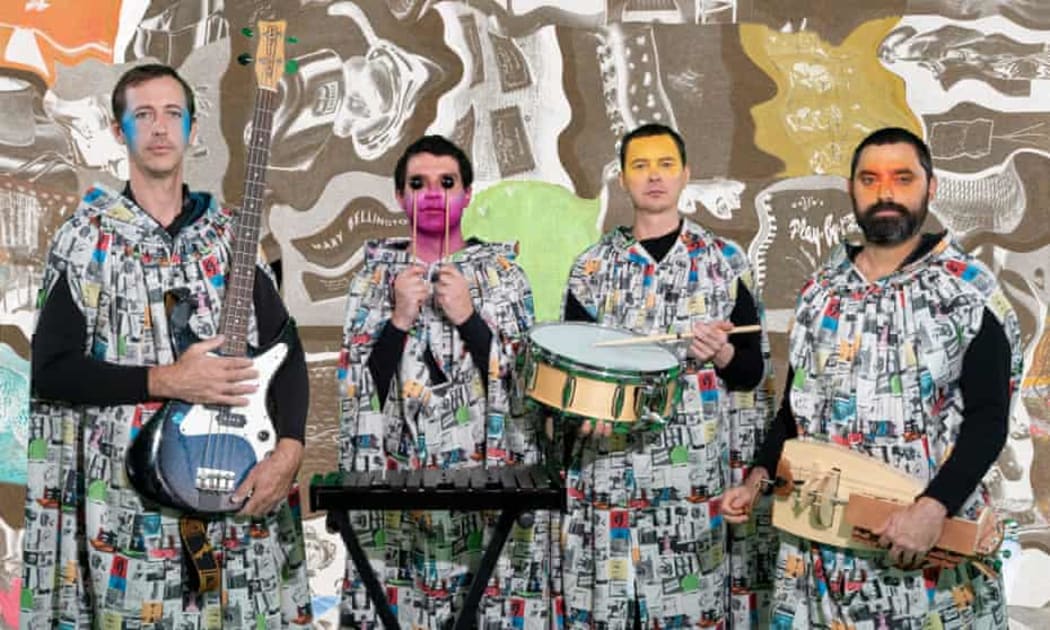Tony Stamp gets stuck into a blockbuster concept album about the afterlife by Canadian pop star The Weeknd, a smooth selection of songs with spiky lyrics by Tāmaki Makaurau/ Maungaturoto songwriter Erny Belle, and the return of mid-2000s folk weirdos Animal Collective.
Dawn FM by The Weeknd

The Weeknd Photo: supplied
Over the last 10 years or so, you may have noticed the length of blockbuster movies increasing. The thinking around this came from studios wanting to offer more bang for viewers’ bucks as home viewing became easier.
A similar thing has happened to albums, particularly those in the pop world. Long-players over 15 tracks, stuffed with interludes and guest stars, arrive feeling like an event, and rather than seeing a budget on screen, you can hear it.
Dawn FM is one such 'event' album, reaching half a billion streams in its first few weeks. And it’s not just big budget-wise, it’s also a concept album, with a thought-through narrative and a sound that harks back to the '80s.
The last album by Canadian pop star The Weeknd (real name Abel Tesfaye) was called After Hours, and featured a narrative that had him made up with bruises and bandages on artwork and in live appearances. In the final song, his character dies.
The concept behind this follow-up sees The Weeknd in purgatory. Tesfaye said he imagined it would be like being stuck in traffic, and a radio station called Dawn FM is playing on the car stereo, guiding you toward the light. It’s a neat idea that he points out could be celebratory or bleak, depending how you look at it.
Tesfaye’s real life neighbour Jim Carrey provides his voice to the otherworldly station. He also co-wrote the final track ‘Phantom Regret by Jim’.
Framing an album around a radio station is nothing new - think of the Reservoir Dogs soundtrack or The Who Sell Out. Setting it in the afterlife gives The Weeknd another visual motif - he’s been wearing old age makeup in appearances for the album - and lets him lean into the glory days of FM radio.
Songs like ‘How Do I Make You Love Me’ obviously present a very modern sounding version of an '80s pop classic, but that seems to be the goal. After Hours introduced elements of new wave into his sound, particularly in its breakthrough single ‘Blinding Lights’, and that’s the song which seems to pass the baton to this album.
The Weeknd is one of those artists who collects genres as he goes, so RnB and dance music are still part of the mix, as were 12 producers, and three executive producers - Tesfaye himself, alongside Swedish pop titan Max Martin, who has written and produced hits like Brittney Spears ‘Hit Me Baby One More Time’, Backstreet Boys ‘I Want It That Way’ and many more; and Oneohtrix Point Never, a pioneer in the genre known as vaporwave, which ironically deconstructs sounds from the '80s and '90s. His albums are avant garde and challenging.
On paper this meeting of minds seems unlikely, but they have a musical alchemy that balances very populist impulses with an ironic '80s aesthetic.
The Weeknd has had plenty of salacious lyrics over the years, but Dawn FM isn’t celebrating debauchery, it’s sifting through his past while he waits to be judged. It seems to suggest actual personal growth on his part.
The concept never wears out its welcome, even when stuffing in guests like Quincy Jones, Lil Wayne, and Tyler the Creator. And because it follows Tesfaye's journey toward the light, its most jubilant song is its last, right before Jim Carrey returns to usher him into the great beyond.
‘Less Than Zero’ is the most cheerful thing The Weeknd’s done, and has unmistakably Swedish pop lineage. It’s a fittingly joyous way to round out such an ambitious pop album (even though he's singing about being dead).
Venus is Home by Erny Belle

Photo:
There’s no rule that says every song has to have a good story behind it, or has to be about anything at all, but I can’t help but be impressed when they do. This debut shows a knack for gorgeous hooks and acerbic lyrics, but those things aside, I appreciate that every track has had deep thought put into its concepts.
Aimee Renata is a musician of Ngāpuhi descent who works under the alias Erny Belle. The track ‘Sorry Not Sorry’ is a good example of what to expect on her album Venus Is Home: angelic singing, sparse arrangements, and something a bit sarcastic sprinkled over like seasoning. The name of the song is defiant, and then features her saying ‘yup/nah’s to underline the point.
A similar kind of irreverent backing vocal finds its way into the track ‘Burning Heaven’. The semi-spoken lines are so playful they jump out from their austere setting; these are songs that are traditional in the best sense, but the quirks are what tip them over from ‘very good’ to ‘great’.
As an example of the thought Renata puts into these tunes, she says ‘Burning Heaven’ is "a conversation between [herself] and what [she identifies] as the spirit of creation. Acknowledging it as a union. It is the practice of balance, within desire. The eternal burning".
She has a background in acting, and I assume that bolstered her flair for the dramatic. She also clearly favours religious metaphor - that song references heaven, and another, ‘Hell Hole’ ponders Tāmaki Makaurau, Auckland, from her perspective as an urban Māori.
Renata describes her sound as ‘part K Road, part rural town up North’. She splits her time between Auckland and Maungaturoto, and listening to that song, you get an idea which she prefers. It’s pretty easy to figure out what the 'hell hole' of the title is.
The whole EP has a dissonance between the beauty of the music and how sardonic it sometimes feels, like calling a stately ethereal ballad ‘Chuck It in the Trash’.
'Venus is Home', the song which gives this EP its name, is an ode to Aimee Renata’s late Grandmother. Similarly her stage name Erny Belle contains references to her Grandfather, brother and sister. Everything here seems to have had an equally deep amount of thought put into it; it’s the foundation on which she’s constructed these beautiful tunes.
‘Island Time’ is another slightly loaded title for another very chill song, which features slide guitar and brings back those playfully spoken backing vocals. Like all these songs it’s smooth, but on closer inspection, has plenty of barbs.
Time Skiffs by Animal Collective

Animal Collective Photo: supplied
In the early 2000s, I was sharing a flat with several other music enthusiasts. The internet was making it much easier to listen to more tunes, and tastemaker blogs were becoming a thing.
I remember the first time we heard a highly buzzed-about freak folk outfit, who wore masks and had stage names, and it being nigh on impenetrable to our untrained ears. A kind of flower power dirge of wailing voices and bashed acoustics. I would not have predicted that same band to have a new album out in 2020, or for it to be so listener friendly.
Animal Collective are actually a good line in the sand for my own listening habits: to me they still sound like they’re colouring outside the margins, but I’ve seen younger listeners who grew up with them refer to them as kind of passé.
It’s true that over the years they stopped feeling like a whirlwind collection of sounds and more like a band, and by the time I saw them support their breakthrough album Merriweather Post Pavilion, it felt predictable, in that they stood on stage and played faithful renditions of their songs.
This new album is called Time Skiffs. It’s their first in five years, and the best thing they’ve done in some time. There are some edges sanded off; less shouty moments than in the past: and everything resembles a song as opposed to an impromptu campfire hootenanny, but they’re also each stuffed with strange sonic details.
On ‘Strung With Everything’ your ears are drawn to its harmonised voices, and there are drums and bass providing a backbone, but headphone listening reveals a lot of skittering, abstract notes making up the rest. Those are provided by Geologist, who generally mans the keyboards, but also provides gong, hurdy gurdy, and the Japanese stringed instrument Taishogoto, among other bits and bobs.
The voices belong to Avey Tare, Panda Bear, and Deakin, and in contrast to recent Animal Collective albums, here they’re often all singing at once, hitting a familiar sweet spot that sounds a bit like The Beach Boys after a hard night.
Bear has the smoothest voice, Tare is more manic and takes the lead most often, and Deakin is the deepest. Their unified voices are the most inviting element on Time Skiffs, particularly on the mesmerising 'Prester John'.
Like plenty of recent albums this had a long gestation - the tracks were written as a group in 2019, but once the pandemic hit all the parts had to be tracked separately by the band’s respective studios. Maybe that’s why Time Skiffs has a slightly calmer, more regulated sound than past efforts.
Freak folk has been a sub genre since the 1960s, and usually involves acoustic instruments mixed with psychedelic elements. Here it’s all those echoing, dubby sounds that provide the ‘freak’ half of the equation.
Despite recording separately, Animal Collective sound more like a band than ever. Time Skiffs is subdued, but still manages to pack in a lot of weirdness.

